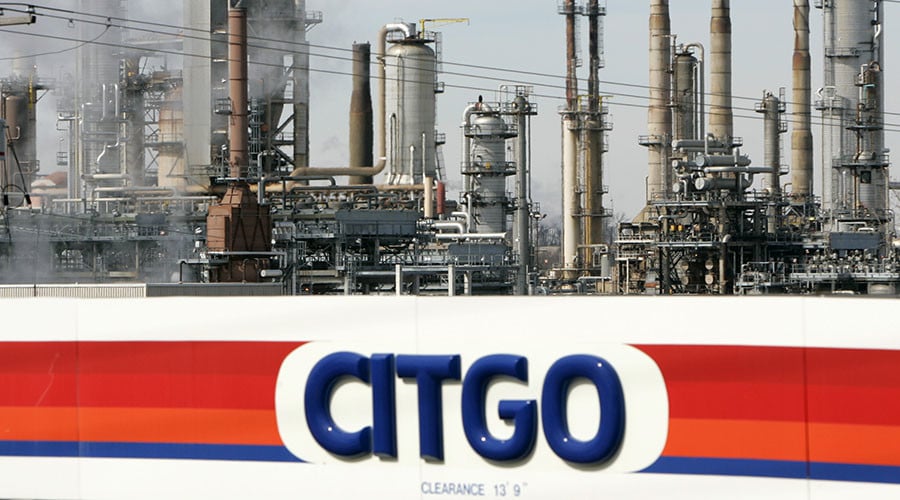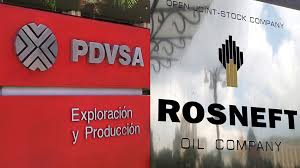by MEMRI
The deal would allow the Russian company to take control of nearly half of the U.S. oil company Citgo, which PDVSA owns, if Venezuela defaults on its debts.
Venezuela's
state-owned oil company, Petroleos de Venezuela (PDVSA), has owned
Citgo, an American refiner with headquarters in Houston, Texas, since
the 1980s. At the end of 2016, cash-strapped Venezuela, in the throes of
a combined economic and political crisis,[1]
put up a large stake (49.9%) in Citgo as collateral in exchange for a
loan from the Russian state-owned oil company Rosneft. Should PDVSA
default on the loan, Rosfnet will gain control over Citgo. It is
noteworthy that the U.S. imposed sanctions on Rosfnet following Russia's
seizure of Crimea in 2014.
On May
3, a bipartisan group of U.S. Senators introduced a wide-ranging bill
calling for sanctions against the Venezuelan government and demanding
President Donald Trump to prevent a deal struck by PDVSA and Rosfnet.
CBS News reported: "The bill calls for the [U.S.] State Department to
coordinate an international response to the crisis in Venezuela… In
addition, a section of the bill highlights a Nov. 30 loan given by
Russia's state-owned oil company, Rosneft, to Venezuela's state-owned
oil company PDVSA. The deal would allow the Russian company to take
control of nearly half of the U.S. oil company Citgo, which PDVSA owns,
if Venezuela defaults on its debts.
"Influential
senators from both parties sponsored the bill, including Senators Ben
Cardin, D-Md.; Marco Rubio, R-Fla.; John Cornyn, R-TX; Dick Durbin,
D-Ill.; John McCain, R-Ariz.; Bill Nelson, D-Fla.; Tim Kaine. D-Va.;
Chris Van Hollen, D-Md. and Bob Menendez, D-NJ."[2]
Earlier,
Republican Congressman Jeff Duncan and Democratic Congressman Albio
Sires sent a letter to U.S. Secretary of Treasury Steven Mnuchin, asking
him to undertake an "immediate review of a recent asset transfer
between Venezuela's state-owned oil company. PDVSA, and Rosneft, which
is under U.S. sanctions. The situation, if left unchecked, could
severely undermine U.S. national security and energy independence."[3]
On April
14, the Russian media outlet Vestifinance.ru, published an article
titled "Rosneft And Citgo: Risk Or Anti-Russian Hysteria?" The article
stated that U.S. lawmakers' actions against The PDVSA-Rosneft deal are
prompted by anti-Russian "hysteria." Vestifinance.ru wrote: "By an
amazing coincidence, a letter to Mnuchin was written just before U.S.
Secretary of State Rex Tillerson's visit to Moscow. And as long as
relations between Moscow and Washington are not improved significantly,
politicians will keep finding new pretexts to incite fears."
Below are excerpts from the Vestifinance.ru article:[4]

(Source: Rt.com)
PDVSA Still Owes Russia $62 billion
"PDVSA, the
Venezuelan state-owned oil company, has paid off its [Russian] loan
along with interest in the amount of $2.2 billion. This is good news as
PDVSA avoided a default. However, the Vice President [of Venezuela]
Tarik El Aissami characterized the situation as 'a merciless economic
war' being waged against the Maduro government. The bad news is that
PDVSA still owes [Russia] $62 billion.
"It is
well-known that some members of the U.S. Congress are quite concerned
about a possible default by Venezuela, since Russian-owned Rosneft can
then get access to the American company Citgo. Citgo owns 48 oil
terminals in 20 U.S. states as well as 3 oil refineries. It is the
control of Rosneft over the American refineries that worries lawmakers
the most.
"'The
Russian government could readily become the second-largest foreign owner
of U.S. domestic refinery capacity. Such a development would give the
Russians more control over oil and gas prices worldwide, inhibit U.S.
energy security, and undermine broader U.S. geopolitical efforts', [U.S.
congressmen] wrote in a letter to Treasury Secretary Steve Mnuchin. 'We
remain deeply concerned over the implications for U.S. national
security.'
How Rosneft Can Take Over CITGO
"Venezuela
has been desperate for cash lately. Petroleos de Venezuela (PDVSA), the
Venezuelan state-owned oil company, has owned Citgo since the 1980s. In
exchange for obtaining a loan from Rosneft in December, the Venezuelan
oil company put up a large stake (49.9%) in Citgo as collateral. If PDVSA is unable to pay off the loan on time, Rosneft will almost certainly gain control over Citgo.
All Rosneft would need for a majority share would be to buy a few more
PDVSA bonds, thus clearing the 50% threshold of ownership.
[Rosneft] Is Not Going To Waste Money For The Illusory Opportunity To Harm The U.S.'
"The
concerns expressed by [the U.S] congressmen are rather strange. What
exactly is Rosneft going to do with three oil refineries? U.S.
politicians believe that the Russian company will be able to take part
in a conspiracy that will lead to a restriction of gasoline production,
raise gas prices and thus cause damage to the U.S. national security or
the American economy. This is plain silly. Even though Rosneft is a
state-owned company, its purpose is still making profit, and it is not
going to waste money for the illusory opportunity to harm the U.S. And
the scenario offered by congressmen has no bearing on reality
whatsoever. "Three refineries is a mere drop in the ocean compared to
the rest of the U.S. oil assets. Even assuming that production could be
reduced at these refineries, this may at most affect one region in the
short term, but then other producers will quickly capture the market and
stabilize it. And so if Rosneft takes over Citgo, it will simply
produce and sell gasoline in the U.S., making money on it, rather than
making insane plans to threaten the U.S. national security.
"Reports in
the U.S. media treat the lawmakers' letter with a healthy dose of irony
and that is why it is difficult to avoid the conclusion that the congressmen are deliberately trying to incite anti-Russian fears.
By an amazing coincidence, a letter to Mnuchin was written just before
U.S. Secretary of State Rex Tillerson's visit to Moscow. And as long as
relations between Moscow and Washington are not improved significantly,
politicians will keep finding new pretexts to incite fears.
"As far as
Venezuela is concerned, yielding control of Citgo is a good way to
reduce its debt burden. Most likely, this will happen no later than in
the fall of 2017, since there is very little chance its economy will
stabilize. Most likely, Venezuela will default and begin to restructure
its debt this year. According to the credit-default swaps market,
investors estimate the chances of Venezuela's default in the next six
months at 41%. And in March that indicator was below 34%."

(Source: Latinamericapost.com)
[1] See MEMRI Special Dispatch N. 6903, Russia's Support For The Venezuelan Regime – An Update, May 2, 2017.
[2] Cbsnews.com, May 3, 2017.
[4] Vestifinance.ru, April 14, 2017.
MEMRI
Source: https://www.memri.org/reports/russia-become-second-largest-foreign-owner-us-domestic-refineries-if-venezuela-defaults
Follow Middle East and Terrorism on Twitter
Copyright - Original materials copyright (c) by the authors.
No comments:
Post a Comment